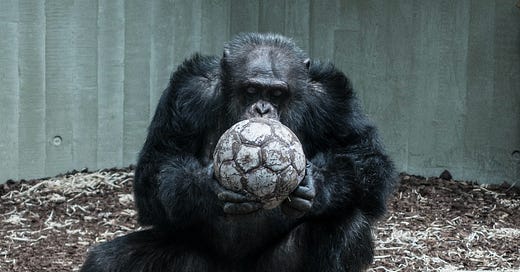The Sulking Ape
The more we learn about the great apes, the less we find to differentiate ourselves from them. All the things we thought made us unique—language, tool-making, complex social bonds, individuality, play—none of them are exclusive to man.
It wasn’t always this way. At least, we didn’t think so. In the medieval period, scholars wrote of the ‘great chain of being’, with angels at the top, then humans, and then the rest: apes, dogs, birds, reptiles, and creep crawlies at the bottom. This fed directly into the enlightenment idea of societal progress (with western civilization at the top)and, thus, the destruction of so-called ‘primitive’ indigenous cultures.
Alas, this so-called progress — with its industrial ambitions — was at the expense of sustainability and we now face the real possibility of consuming our way into extinction. Our economic model is based around relentless expansion, endless growth, and we are now running out of space. So what should we do? If it was our false sense of superiority that got us into this mess, perhaps the knowledge that we are basically apes will save us?
But, I’m getting ahead of myself, first we have to understand why, despite being almost genetically identical, humans are so different compared to chimpanzees and gorillas.
The clue is in their testicles.
Gorillas, despite being huge (weighing in at around 400lbs), have tiny balls (1oz. in total). Chimpanzee bollocks are comparatively massive (4oz. on a 100lbs body). Human beings are somewhere in-between (150/200lbs body and 1.5oz. balls). The reason for this disparity can be found how each species mates.
Gorilla males, for instance, have developed a system whereby they dominate harems of three to six females. The only way another male can get a mate is through fighting and killing another male. The victor will then proceed to kill the offspring of the loser, which induces the frankly whorish females to become hot and fertile.
Chimpanzees have effectively deferred this violence so that it takes place in the womb. With their big bollocks and multiple sexual couplings, it is the male who can get the most sperm into the female that tends to produce the most offspring.
Humans, by contrast, rarely kill their sexual rivals to set up harems or engage in spunky orgies, tending to settle in societies based around serial monogamy. As with all systems subject to evolution, it is just as competitive, but the competition doesn’t involve quite so much sex and death.
Instead, we have flashy cars, designer labels, gelled hair, expensive gadgets, and other accoutrements of success. These are the signifiers of status, showing that you are a provider and your mate should be a receptacle for your gametes. The competition to get these objects of desire is fierce and provides an explanation for why people waste their life chasing after them. For the Escapologist, such vulgarities are to be scorned. Not because an Escapologist cannot be a success, but because they understand that, in an overpopulated world that is running short of resources, success is about various complicated forms of pleasure, not material wealth.

A few years ago, I was watching a nature documentary about chimpanzees, when they singled one out that was sulking alone whilst the other chimps had fun. According to the narrator he had been rejected as alpha male and had left the group. His prospects didn’t look very good: he was mangy, gaunt, and flea-bitten, with a perplexed look of alienation in his eyes.
Chimpanzees can barely survive outside of society; their social groups are built around food, grooming, and sex, without these shared interactions they sink into depression. For human beings things are a bit more complex, not least because we have anti-depressants, but the result is the same: rejecting society causes deep unhappiness, affecting our health, wealth, motivation, and levels of anxiety.
For the Escapologist, faced with mind-numbing jobs and the idiocy of the mainstream media, the issue is especially pressing: how can you be an outsider without losing the benefits of society? It is tempting to give up everything, to live isolated in a minimalist bubble, but I think there is a better way: embracing hierarchies.
Hierarchies have a bad reputation these days. We fear them as being undemocratic, preferring the blandness of the popularity contests to the unique and the different. Tabloids and websites is built around the idea of tall poppy syndrome, where those who set themselves apart from the group are ridiculed and brought down as a way of restoring harmony. And we are bound by political correctness to say that everyone is equal, no matter how rich, talented, intelligent, or strong they are. Yet we don’t believe it, at least not on an unconscious level. As the primatologist Frans de Waal has shown, the body language and verbal tones we adopt around high status people is completely different.
The irony is that many human beings now live in modern urban societies which allow for millions of sub-groups to be set up. The Internet has the potential to connect beyond the traditional, narrow hierarchies.
So, create a magazine, get people to write for it, join clubs, start a band, experiment, do the things that scare you, do things that are foolhardy, be sociable, improve your social skills (and they are skills), become a leader of a small group. You can always find a niche in which you can develop into an expert. Dedicate yourself to a niche you love rather than feeling obliged to trudge the same path as everyone else.
This article was originally published in issue six of New Escapologist magazine.
Read my other New Escapologist articles.






